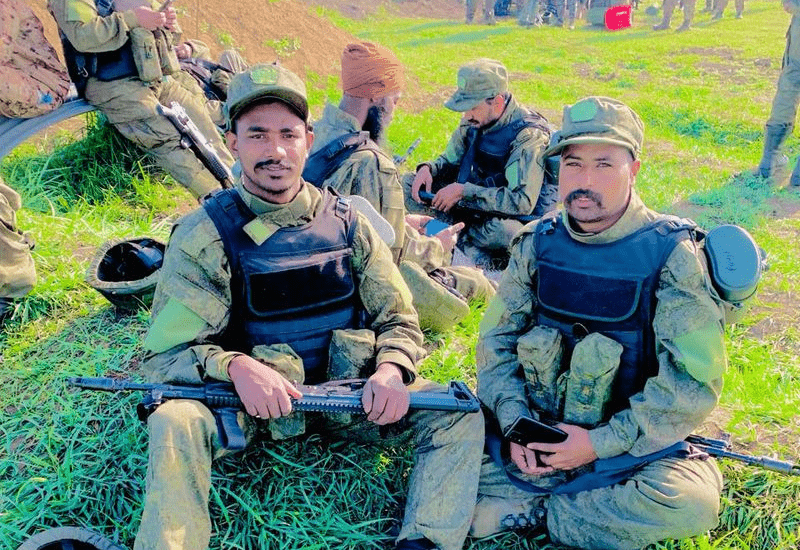AI Generated Summary
- Their journey—from the battlegrounds of Krasnohorivka to the modest trades of everyday India—serves as a poignant reminder that, for many, the true promise lies not in the glitter of foreign lands, but in the steadfast, if sometimes humble, embrace of home and family.
- Recent tragedies—including the death of a 32-year-old Keralite named Binil and injuries to another serving under the Russian armed forces—have prompted the Indian Ministry of External Affairs (MEA) to once again call for the early repatriation of all citizens involved in Russia’s conflict with Ukraine.
- These young men, lured by promises of Rs 1 lakh per month, a Rs 7 lakh signing bonus, and even the possibility of Russian citizenship, answered an Instagram advertisement that seemed to offer a better life.
Once armed with assault rifles and assigned to deliver supplies to Russian soldiers in the brutal conflict in Ukraine’s Donetsk region, a group of youths from Amritsar is now trading battlefields for bicycles and plumbing tools. Their remarkable journey from serving as “helpers” in a far-off war zone to resuming modest trades back home highlights both the allure of quick fortunes abroad and the enduring pull of family and familiar soil.
These young men, lured by promises of Rs 1 lakh per month, a Rs 7 lakh signing bonus, and even the possibility of Russian citizenship, answered an Instagram advertisement that seemed to offer a better life. In January last year, many like 26-year-old Rohit from Ajnala accepted offers that would eventually see them deployed amid the harsh winter and daily perils of the battlefield. “Having witnessed gory scenes and the destruction caused by the war, low wages and long working hours don’t bother me anymore,” Rohit reflected upon his return. “Last month, I was in Rajasthan and now in Baddi, Himachal Pradesh, due to my job. Weather in our country is tolerable compared to the extreme winter we had to endure in Russia. It is better to earn less and stay with one’s family.”
The transformation these youths underwent is profound. Where once they moved in tanks and army trucks, today they navigate life on bikes and bicycles. Their daily work now involves tasks as varied as installing boilers across North India, plumbing, wallpapering, and dairy work—jobs that they had pursued before the call of duty sent them overseas. Though life back home appears to have returned to “normal,” many carry the weight of memories from a war zone fraught with flying explosives, dreaded drones, and moments of profound loss.
Seven to ten months of deployment in Russia left an indelible mark on these young men. For instance, during his service as an Army helper delivering eatables along dangerous frontlines, Rohit witnessed the death of a Russian soldier in an incident captured by Ukrainian drones. Such experiences now underscore a bittersweet return to civilian life—a life punctuated by long hours and modest pay but enriched by the solace of family and safety.
Among those who have safely returned thanks to a coordinated repatriation effort—sparked by a direct appeal from Prime Minister Narendra Modi to Russian President Vladimir Putin on July 8—are Jaimal Singh (25), Sarbjit Singh (50), Avtar Singh, and Sukhman Singh. Jaimal, now content with his plumbing job, even reports an increase in his monthly earnings—from Rs 15,000 to nearly Rs 20,000—as he travels to neighboring villages for work. “I now appreciate the quieter, stable life at home,” he noted, acknowledging that the familiarity of his community far outweighs the fleeting promises made during his stint in Russia.
Other community members, such as Shamsher Singh (22) and Avinash (21), who once had dreams spurred by overseas job prospects, have also returned to their original daily-wage labor. “I tell everyone it is better to be with your family and stay in your home country even if you earn less,” said neighbor Baljit Singh, 62, a local farmer, underscoring a growing sentiment in the community.
The return of these youths has also refocused national attention on the dangers of such overseas deployments. Recent tragedies—including the death of a 32-year-old Keralite named Binil and injuries to another serving under the Russian armed forces—have prompted the Indian Ministry of External Affairs (MEA) to once again call for the early repatriation of all citizens involved in Russia’s conflict with Ukraine.
As the scars of war gradually begin to fade under the weight of daily chores and routine hardships, these young men carry forward a dual legacy of both resilience and regret. Their journey—from the battlegrounds of Krasnohorivka to the modest trades of everyday India—serves as a poignant reminder that, for many, the true promise lies not in the glitter of foreign lands, but in the steadfast, if sometimes humble, embrace of home and family.




